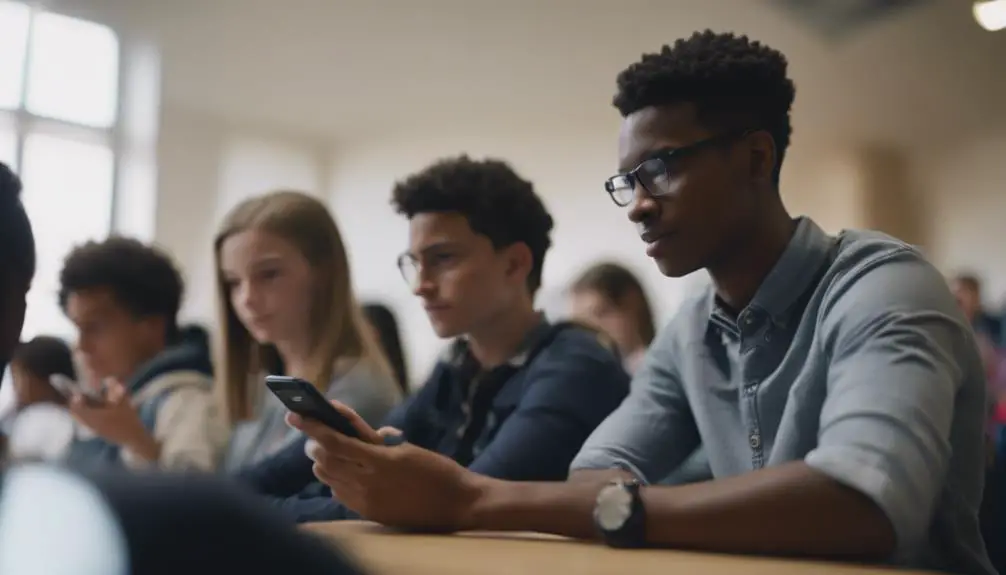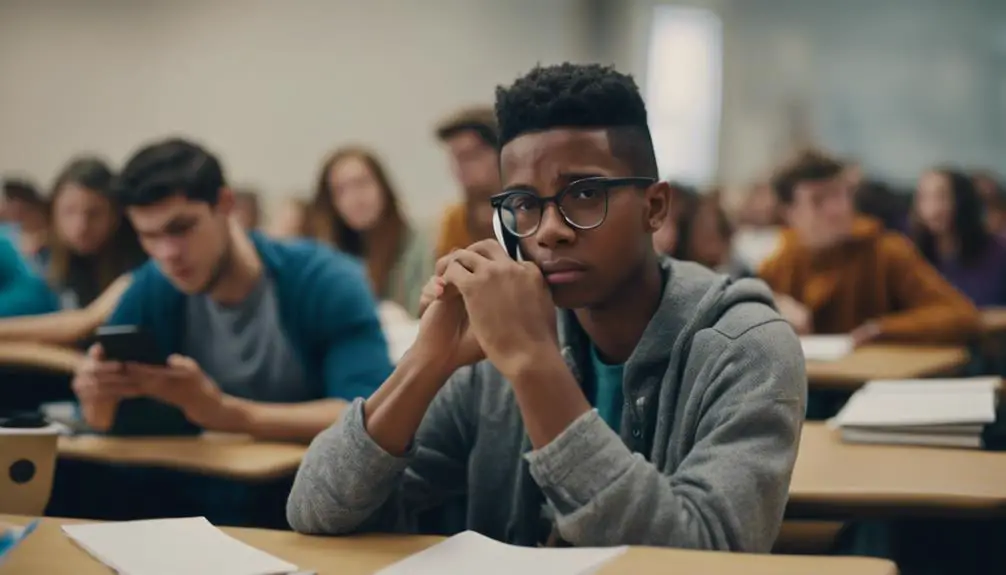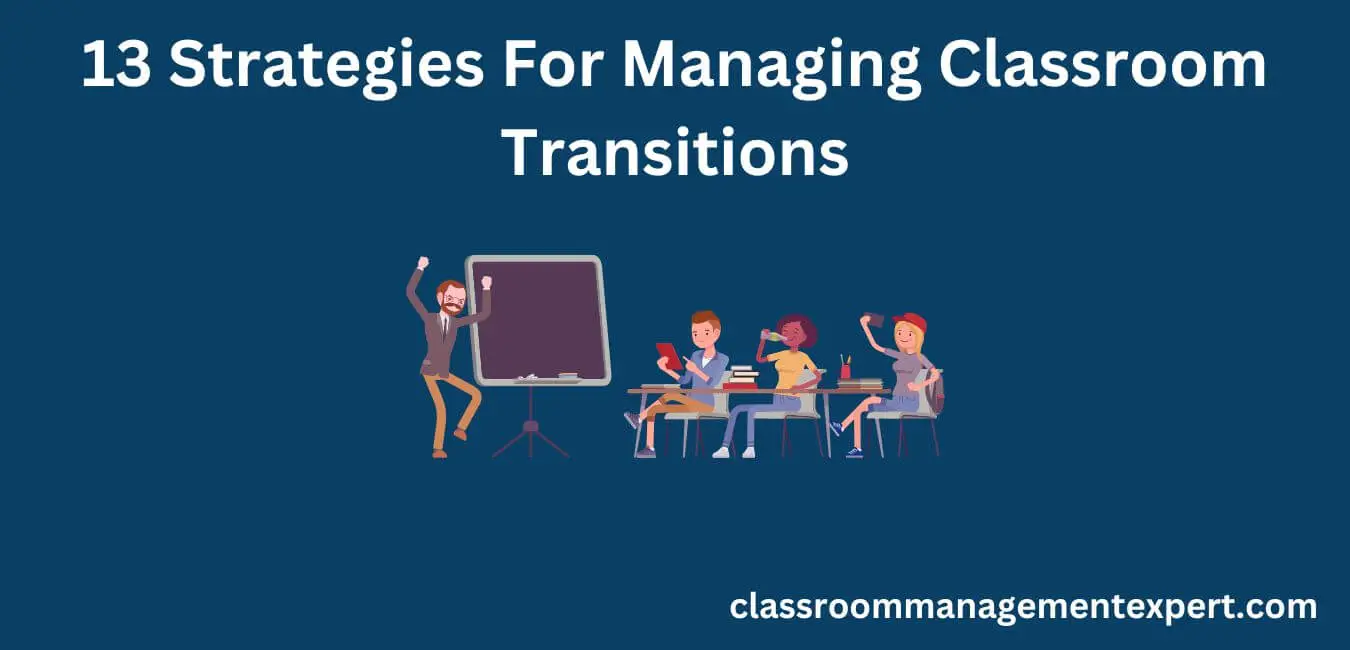Have you experienced a classroom where students frequently disrupt the silence by talking out of turn, disobeying instructions, or using disrespectful language? This situation can create a challenging learning environment for both teachers and students.
However, there are also subtle forms of disrespect that often go unnoticed but can significantly impact the classroom dynamic.
Let’s look into these seemingly minor behaviors that, if not addressed, can have significant consequences.
25 examples of disrespectful behavior in the classroom

When students engage in talking out of turn, ignoring instructions, or using disrespectful language in the classroom, it disrupts the learning environment.
Moreover, disregarding the teacher’s authority and making rude comments are also considered disrespectful behaviors that can negatively impact the overall classroom dynamic and student achievement.
It’s essential to address and discourage such behaviors to maintain a respectful and conducive atmosphere for learning.
Talking Out of Turn
Talking out of turn disrupts the classroom flow and demonstrates a lack of respect for the teacher and classmates. This behavior can interrupt the learning environment and disrupt academic decorum. Students should be mindful of their actions and adhere to proper classroom etiquette.
When students speak out of turn, it not only impacts their learning but also that of others. Managing this behavior as a teacher can be challenging. Establishing clear expectations and consequences can help maintain order and cultivate a respectful classroom atmosphere.
Addressing talking out of turn promptly and effectively enables teachers to create a space where all students feel respected and can learn without unnecessary interruptions.
Not Following Instructions
Not following instructions in the classroom disrupts the learning process and demonstrates a lack of respect for the teacher and peers. It causes distractions, and delays in the lesson, and reflects poorly on classroom behavior.
This behavior also challenges the authority of the teacher and undermines efforts to maintain discipline among students. Students hinder their own progress and that of their classmates by not adhering to academic expectations.
Disregarding instructions creates a chaotic atmosphere that hampers the overall effectiveness of the learning environment. Therefore, it’s crucial for students to promptly and attentively follow instructions to maintain a respectful and conducive classroom setting.
Using Disrespectful Language
Using disrespectful language in the classroom undermines the respect and professionalism that should be maintained among students and teachers. Disrespectful language in writing assignments can create a negative atmosphere and hinder learning.
It’s important to address disrespectful language in parent-teacher conferences to ensure parents are aware of the issue and can support efforts to address it. The impact of disrespectful language on classroom dynamics is significant, as it can lead to a breakdown in communication and mutual respect among students.
Implementing strategies for addressing disrespectful language, such as engaging in classroom discussions on appropriate language use and outlining consequences for disrespectful behavior, is essential. School policies play a vital role in addressing disrespectful language by providing guidelines and consequences for such behavior.
Ignoring the Teacher
Ignoring the teacher can disrupt the learning environment and demonstrate a lack of respect for authority in the classroom. When students choose to disregard the teacher’s instructions, it can lead to various negative outcomes:
- Classroom disruptions: Ignoring the teacher can create distractions for other students, making it difficult for everyone to focus and learn effectively.
- Teacher disrespect: It conveys a message of disrespect towards the teacher, which can undermine their authority and make it challenging to manage the class.
- Student disengagement: Ignoring the teacher often indicates a lack of interest or engagement in the lesson, resulting in missed learning opportunities and academic struggles.
Promptly addressing these disruptive behaviors is essential for maintaining a positive and productive learning environment.
Making Rude Comments
Making rude comments in the classroom is a disrespectful behavior that can disrupt learning and create a negative atmosphere. Addressing rudeness directly is crucial to maintaining respect in the classroom. Understanding why these comments are made can help approach the situation with empathy.
Setting clear boundaries on acceptable behavior can prevent rude comments from escalating. Building empathy through open communication and discussing the impact of hurtful words is essential for fostering a positive classroom environment. Encouraging positive behavior through praise and reinforcement can motivate students to communicate respectfully, leading to a more harmonious learning space.
Disrupting Class Activities
Disruptive behavior in the classroom, such as interrupting lessons, talking out of turn, or engaging in unrelated activities, can significantly disrupt the learning environment and hinder the educational experience for all students. These disruptions can lead to reduced focus, decreased productivity, and a waste of valuable learning time. It’s crucial for teachers to promptly address disruptive behavior, establish clear expectations, and implement consequences for repeated disruptions to maintain a harmonious learning atmosphere.
Consequences for disruptive behavior should be fair yet firm to ensure a productive classroom environment for all students. By implementing proactive measures like engaging lessons and effective communication, teachers can prevent disruptions before they occur and create a more conducive learning environment for everyone involved.
Mocking Classmates or Teachers
Making fun of classmates or teachers is disrespectful and harms the learning environment. It can upset those targeted and disrupt the focus needed for education.
To address this behavior, methods like role-playing, positive reinforcement, empathy building, communication skills, and conflict resolution can help. These strategies teach students about the impact of their actions, promote respect for others, and create a supportive classroom.
Refusing to Participate
Refusing to participate in classroom activities not only hampers your own learning but also disrupts the collaborative and engaging atmosphere crucial for academic progress. Feeling pressured to contribute is common, but active involvement benefits everyone involved.
Teachers can use various methods like group discussions, hands-on activities, and interactive technologies to encourage participation.
Bullying Other Students
Bullying other students in the classroom creates a harmful environment that disrupts the sense of safety and respect needed for effective learning. Preventing cyberbullying is crucial in today’s digital age, where hurtful messages can quickly spread.
Using peer mediation strategies can empower students to peacefully resolve conflicts, fostering a positive classroom atmosphere. Anti-bullying programs are essential for teaching students about empathy and kindness, highlighting the significance of treating others with dignity.
Defying Authority Figures
When students openly challenge or disregard directives from their teachers, they show disrespectful behavior in the classroom. This defiance creates a disruptive atmosphere that hampers learning. Here are three behaviors linked to defying authority figures:
- Challenging authority: Students who question or refuse to follow instructions undermine the teacher’s position.
- Defying rules: Disregarding classroom guidelines or breaking established rules demonstrates a lack of respect for the teacher’s authority.
- Power struggles: Constantly battling for control can lead to a negative dynamic between students and teachers, impeding the educational process.
It’s crucial to address these behaviors promptly and effectively to maintain a respectful and harmonious classroom environment.
Cheating on Assignments
Cheating on assignments erodes the integrity of the educational process and shows a disregard for academic standards. Academic dishonesty, such as plagiarism, can lead to serious repercussions like failing grades or expulsion from educational institutions. To deter cheating, effective strategies include using various assessment formats and employing plagiarism detection tools.
It’s also vital to educate students on ethics and the significance of academic integrity. By reinforcing the value of honest work and discussing the negative effects of cheating, students are more likely to grasp the importance of integrity in their learning and within the academic community. Cultivating a culture of honesty and integrity is essential in combating cheating in educational environments.
Being Consistently Late
Consistently arriving late to class disrupts the learning environment and shows a lack of respect for the instructor and fellow students. Students are expected to be punctual to ensure a smooth start to the lesson. Chronic tardiness can result in missed instructions, lower grades, or disciplinary actions. It also affects the flow of the class and can be distracting for everyone.
To address this issue, effective teacher-student communication is essential. Educators should clearly explain the importance of being on time and how it impacts the class. Encouraging students to improve their time management skills and providing support in implementing strategies for punctuality can help create a more respectful and productive learning atmosphere.
Showing No Interest
When students show little interest in class, it can signal disrespectful behavior. To address this, it’s vital to use effective engagement strategies.
Engage students with interactive and relevant activities to promote active learning. Developing relationships with students can increase their interest in the material. Cultivating a positive classroom environment where students feel valued and respected can help combat disinterest.
Teasing or Taunting
When students engage in teasing or taunting behaviors in the classroom, it disrupts the learning environment and shows a lack of respect. Addressing these behaviors is essential for maintaining a safe and inclusive space for learning.
Here are some strategies to help prevent and address teasing or taunting:
- Early Intervention: Implementing strategies to recognize and address teasing or taunting behavior early can prevent it from escalating into more serious issues.
- Promoting Positive Behavior: Encouraging positive interactions and behaviors through praise and rewards can reinforce respectful conduct among students.
- Conflict Resolution Skills: Teaching students effective communication and mediation techniques can help them resolve conflicts peacefully and respectfully.
Not Completing Homework
Failing to complete homework not only impacts the individual student but also disrupts the flow of the entire class. It shows poor time management, lack of accountability, and irresponsibility by the student. Additionally, it undermines academic integrity and work ethic, setting a negative example for peers.
The consequences of not completing homework in the classroom are as follows:
- Time Management: Poor planning and prioritization lead to incomplete assignments and rushed work.
- Accountability Issues: Lack of ownership results in disappointing grades and missed learning opportunities.
- Academic Integrity: Failure to uphold honesty and diligence may lead to potential academic penalties and erosion of trust.
- Work Ethic: Demonstrating laziness and lack of commitment can lead to diminished academic performance and hinder future success.
Being Argumentative
Arguing in the classroom can disrupt the learning environment and hinder productive discussions among students and teachers. However, engaging in debates with an open mind and a willingness to learn from others’ perspectives can be beneficial.
It’s important to give and receive constructive criticism with respect, focusing on improving understanding rather than proving oneself right. Active listening is crucial for meaningful interactions, showing consideration for others’ viewpoints, and fostering mutual respect.
Not Listening Attentively
Not actively participating in classroom discussions can be seen as disrespectful and can impede the learning process for both oneself and others. Actively listening is essential for engaging in the classroom and for having respectful interactions. When one doesn’t participate attentively, it can interrupt the exchange of ideas and hinder effective communication.
Here are some consequences of not listening attentively in the classroom:
- Missed Learning Opportunities
- Disrupting Class Dynamics
- Lack of Understanding of Concepts
- Ineffective Collaboration
- Frustration for Teachers and Peers
It is important to practice active participation to create a positive learning environment where everyone can benefit from clear communication.
Talking Back Rudely
Talking back rudely in the classroom disrupts the atmosphere of respect and hinders constructive communication between students and teachers. Prompt communication with parents is essential to address this behavior effectively. By informing parents promptly, educators can work collaboratively to tackle instances of rudeness.
Establishing clear expectations and consequences for disrespectful behavior, such as talking back rudely, is crucial for maintaining a positive classroom environment. Teaching students appropriate ways to express their thoughts and feelings can also help reduce instances of rude retorts, promoting better conflict resolution skills.
Addressing talking back rudely through student discipline, reinforcing respectful interactions, and fostering open communication between parents and teachers can synergistically create a more respectful atmosphere in the classroom.
Interrupting Others Frequently
Frequent interruptions in the classroom can disrupt the learning process and show a lack of consideration for others.
When students interrupt their peers, it can make it hard for everyone to focus and understand. Teachers may need to step in to keep things on track, leading to a chaotic environment.
Communication can also break down when interruptions happen often.
It’s important to address interruptions promptly to maintain a respectful and effective learning environment.
Disregarding Classroom Rules
Disregarding classroom rules can disrupt the learning experience for everyone involved. Ignoring guidelines such as being punctual, using electronic devices inappropriately, or speaking out of turn can interrupt the class flow.
Not following the teacher’s instructions undermines the structure necessary for effective learning and shows a lack of respect for their authority. Such behavior not only leads to academic misconduct but also sets a negative example for others.
Respecting and following classroom rules is crucial for creating a positive and productive learning environment.
Showing a Lack of Respect
In my experience as a student, displaying a dismissive attitude towards classmates or the teacher through interruptions, talking over others, or making disrespectful comments shows a lack of respect in the classroom. This behavior can result in strained relationships, limited learning opportunities, and disciplinary actions.
To promote classroom respect, effective strategies include encouraging active listening, fostering open dialogue, and emphasizing empathy. Open and clear communication between students and teachers is essential to address disrespectful behavior promptly and constructively.
Rolling Eyes Disrespectfully
Eye-rolling disrespectfully in the classroom indicates a lack of respect for the speaker or the topic being discussed. Body language is a powerful form of communication, and eye-rolling conveys disrespect more strongly than words.
Such nonverbal cues can disrupt the classroom environment and create a negative atmosphere. When students display disrespectful behavior like eye-rolling, it impacts social interactions and can strain the relationship between teachers and students, leading to a breakdown in mutual respect.
Addressing this behavior promptly is crucial for maintaining a positive and respectful learning environment.
Making Fun of Others
Making fun of others in the classroom is a harmful behavior that creates a toxic learning environment. It undermines peer acceptance and disrupts social dynamics crucial for a positive educational setting. Engaging in such behavior shows a lack of emotional intelligence and empathy towards classmates.
Instead of fostering a supportive atmosphere, making fun of others can lead to conflicts and strained relationships. To address this issue, promoting activities that build empathy and understanding among students is essential. Teaching conflict resolution strategies helps handle disagreements respectfully.
Using Electronic Devices
Using electronic devices in the classroom can create a disruptive and disrespectful learning environment. Students must grasp the importance of being present and engaged during lessons.
When technology boundaries are crossed, it can lead to classroom distractions that hinder not only the individual’s learning but also that of their peers. Teaching digital manners early on is key to preventing violations of phone policies.
Setting clear expectations for technology use helps students establish a respectful environment where learning takes precedence over distractions.
Not Taking Responsibility
Avoiding responsibility for one’s actions is a common form of disrespectful behavior that can disrupt the classroom environment. When students blame others, make excuses, dodge consequences, shift blame, or deny accountability, it creates a negative atmosphere. Refusing to admit mistakes and instead pointing fingers or creating elaborate excuses not only hinders their own learning but also impacts others.
Addressing this behavior promptly and teaching students the importance of owning up to their actions is crucial for fostering a respectful and accountable classroom environment.
Conclusion
Having witnessed numerous instances of disrespectful behavior in the classroom, it’s evident that this issue is widespread and harmful to the learning environment.
Addressing and correcting these behaviors is crucial to fostering a positive and productive atmosphere for students to thrive in.
Recognizing the impact of disrespectful behavior and taking action are essential steps to ensure a respectful and inclusive classroom for all.


















